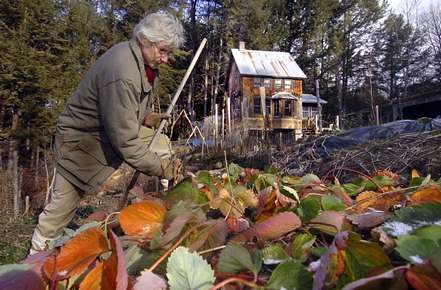
Energy use and prodigious consumption go together, as anyone living in America--in the most consumer-focused society in the history of the planet--is keenly aware (but often oblivous to the consequences). Jim Merkel, an engineer living in a small town in Vermont made the transition from (as he describes it) a jet-set military salesman who voted for Reagan to a bleeding-heart pacifist, eco-veggie-head-hooligan. Along the way, he dramatically simplified his life, shedding many of his "toys", and figured out how to live comfortably on 5,000 USD a year.
The story of Merkel's amazing transformation,
which recently appeared in the Times Argus, is especially timely as many of us are trying to figure out how to cope with the current economic downturn.
Times Argus staff writer, Kevin O'Conner, effectively paints a picture of Merkel's evolution from consumer to conserver, with many examples of the motivations behind adopting a simpler lifestyle, gleaned from a number of different cultures, including the Navajos. Ultimately, the lesson is pretty simple.
So what’s Merkel’s solution?
“The easiest is simply to take less.”
He also suggests “sharing” housing and transportation (“Share with another person and halve your impact; with four people, quarter the impact”) and “caring” for what you have, be it properly maintaining household items or supporting communities by producing and purchasing goods locally.
Farm stands and mom-and-pop stores are close, but aren’t supermarket prices cheaper?
“What you don’t pay over the counter you pay in taxes, dirty air, dead animals, polluted water, clear-cut forests, sweatshops and strip-mined lands,” Merkel writes in his book. “Small-scale bioregional producers, although their products might use less energy and materials and create less waste, don’t get big tax breaks and bailouts or discounted access to resources because they wield less political influence.”
More on Merkel's vision and the details of his simplified life on his Web site:
The Global Living Project.

